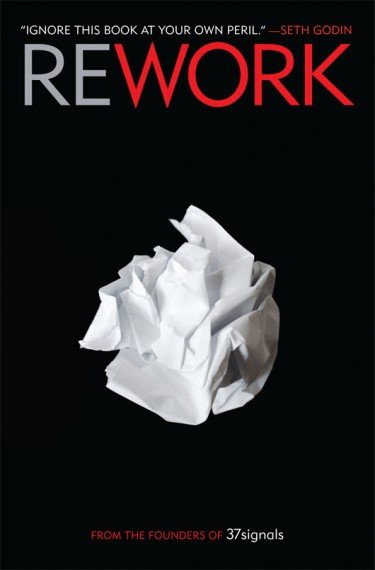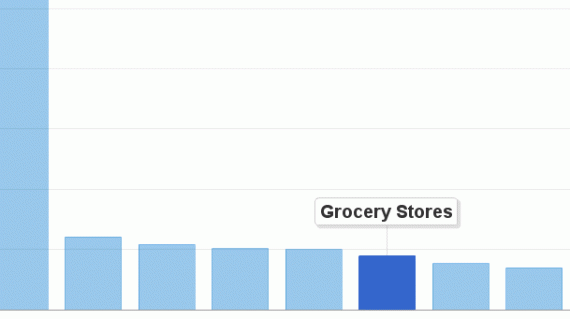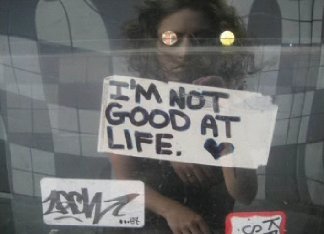WWE’s “MVP” reaches out to troubled teens – hoping they will learn from his past mistakes. Michelle Miller reports.
Month: March 2010
Accept The Praise
Sales Are Vanity. Profits Are Sanity
“Sales are vanity. Profits are sanity.” http://bit.ly/dlg4N5” – Jason Fried (@jasonfried)
Rework By Jason Fried & David Heinemeir Hansson
I had a very productive day today and am happy to say I got through reading Rework which I really enjoyed. Below are my notes from the book:
- Ignore the real world
- Don’t listen when others say something can’t be done.
- Failure is not a rite of passage
- With so much failure in the air, you can’t help but breath it in. Don’t inhale. Don’t get fooled by the stats. Other people’s failures are just that: other people’s failures.
- Planning is guessing
- Unless you’re a fortune teller, long-term business planning is a fantasy. They’re just too many factors that are out of your hands: market conditions, competitors, customers, the economy, etc. Running a plan makes you feel in control of things you can’t actually control. Why don’t we just call plans what they really are: guesses. Start your business plans as business guesses, your financial plans as financial guesses, and your strategic plans and strategic guesses. They just aren’t worth the stress. When you turn your guesses in the plans, you enter a danger zone. Plans let the past try the future. They put the blinders on you. “This is where we’re going because, well, that’s where we said we were going.”
- Why grow?
- Have you ever noticed that while small businesses wish they were bigger, big businesses dream about being more agile and flexible? And remember, once you get big, it’s really hard to shrink without find
people, damaging morale, and changing the entire way you do business. Don’t be insecure about being mean to be a small business. Anyone who runs the business that’s sustainable and profitable, whether it’s big or small, should be proud.
- Have you ever noticed that while small businesses wish they were bigger, big businesses dream about being more agile and flexible? And remember, once you get big, it’s really hard to shrink without find
- Workaholism
- Not only is this workaholism unnecessary, it’s stupid. Working doesn’t mean you care more or get more done. You just need you work more. Workaholics miss the point, too. You try to fix problems by throwing sure towers at them. To try to make up for intellectual laziness with brute force. This results in elegant solutions. Workaholics are heroes. They don’t save the day, just use it up. The real hero is already home because they figured out a faster way to get things done.
- Be a starter!
- Instead of entrepreneurs, let’s just call them starters. Anyone who creates a new business is a starter. You don’t need an MBA, a certificate, the fancy suit, a briefcase, or an above average tolerance for risk. You just need an idea, the touch of confidence, and a push to get started.
- Make a dent in the universe!
- If you’re going to do something, do something that matters.
- Scratch your own itch.
- The easiest, most straightforward way to create a great product or service is to make something you want to use.
- Start making something
- We all know that that one friend who says I had the idea for eBay. Only had they acted on it, they’d be a billionaire! That logic is pathetic and delusional. Having the idea for eBay has nothing to do with actually creating eBay. What you do is what matters, not what you think or say or plan. The most important thing is to begin. Ideas are cheap and plentiful. The real question is how well you will execute.
- No time is no excuse
- The most common excuse people give is there’s not enough time. They claimed they love to start a company, learn an instrument, market and invention, write a book, or whatever, but there just aren’t enough hours in the day.
- Live it or leave it!
- Imagine you’re standing in a rental car office. The rooms cold. The carpet is dirty. There’s no one at the counter. And then you see a tattered piece of paper with some clip rt at the top of it came to a bulletin board. Standing for something isn’t just about writing it down. It’s about believing it and living it.
- You need a commitment strategy not an exit strategy
- Building to flip is building to flop. Embrace constraints
- Stop whining
- Less is a good thing. Constraints are advantageous in disguise. Limited resources force you to make do with what you’ve got. Here’s no room for waste. And that forces you to be creative. Ever seen what a prisoner can do with a spoon? They make do witch what they’ve got.
- You’re better off with a kick ass half than a half ass whole.
- Ignore the details early on. Architects don’t worry about which tiles go in the shower or which brand of dishwasher to install in the kitchen until after the floor plan is finalized. They know it’s better to decide these details later. You need to approach your idea the same way. Details make the difference. But getting infatuated with details to early leads to disagreement, meetings, and delays.
- Reasons to quit
- Why are you doing this?
- Is this actually useful?
- Are you adding value?
- Will this change behavior?
- Is there an easier way?
- What could you be doing instead?
- Focus on what won’t change
- A lot of companies focus on the next big thing. That’s a fool’s path. Focus on things that people are going to want today and 10 years from now. Those are things that you should invest in.
- Interruption is the enemy of productivity
- If you’re constantly staying late and working weekends, it’s not because there’s too much work to be done. It’s because you’re not getting enough done at work. And the reasons and options. Getting into the zone takes time and requires avoiding interruptions. It’s like REM sleep: you don’t just go directly into REM sleep. You go to sleep first and then make your way to REM. Any interruptions force you start over.
- Nobody likes plastic flowers
- The business world is full of professionals who wear the uniform can try to seem perfect. In truth, they just come off as stiff and boring.
- No one can relate to people like that. Don’t be afraid to show your flaws. Imperfections are real and people respond to real. It’s why we like real flowers the will, not perfect plastic ones that never change. Don’t worry about how you’re supposed to sound and how you’re supposed to act. Show the world what you really like, warts and all. There is a beauty to imperfection.
- Drug dealers get it right. Drug dealers are astute business people. They know the product is so good. They’re willing to give a little away for free upfront they know you’ll be back for more with money. Emulate drug dealers. Don’t be afraid to give a little away for free as long as you got something else to sell. Be confident in what you’re offering. You should know that people will come back for more. If you’re not talking about that, you having for the strong enough products.
- You don’t create a culture
- You don’t create a culture. It happens. This is my new companies don’t have a culture. Culture is the byproduct of consistent behavior. If you encourage people to share, ensuring will be built in your culture. If you award trust, and trust. We built in. If you treat customers right, treating customers right becomes your culture.
- They are not 13
- When you treat people as children, you get children’s work. Yet that’s exactly how a lot of companies and managers treat employees. Employees need to ask permission before they can do anything. They need to get approval for every time you expenditure. It surprising you don’t have to get a hall pass to go take a poop. When everything consistently needs approval, you credit culture of non-thinkers. Y
- What you do gain if you ban employees from, say, visiting a social networking site are watching YouTube while at work? You gain nothing. That time does it magically convert to work till just find some other diversion. And look, you’re not going to get up for eight hours a day of people anyways. That’s a minute. They might be at the office for errors, but I’m not actually working hours. People need diversions. It helped disrupt the monotony of the workday. Little YouTube or Facebook time
never hurt anyone.
- Forget about formal education
- There are companies out there who have educational requirements. They only hire people with a college degree or advanced degree or a certain GPA or certification of some sort or some other requirements. Come on. They’re plenty of intelligent people who don’t excel in the classroom. Don’t fall into the trap of thinking you need someone from one of the best schools in order to get results. 90% of CEOs currently heading the top 500 American companies did not receive undergraduate degrees from Ivy League colleges. In fact more received undergrad degrees from University Wisconsin than from Harvard.
- How to teach your competition
- Teaching isn’t something your competitors are even thinking about. Most businesses focus on selling or servicing, but teaching never even occurs to them. Teach and your form a bond you just don’t get from traditional marketing tactics.
- Buying people’s attention with a magazine or online banner ad is one thing. Earning their loyalty by teaching them forms for different connection. Don’t trust you more. The respect you more.
- Meetings are toxic
- The worse interruptions of all are meetings.
- Here’s why:
- You’re usually about words and abstract concepts not real things
- They usually convey in a of information for minutes
- They require thorough preparation that most people don’t have time for.
- They usually have agendas so vague that nobody is really sure the goal.
- Meetings procreate. One meeting leads to another to another to another
- It’s also unfortunate meetings are typically schedule like TV shows. You set aside 30 minutes or an hour because that’s a scheduling software works. Too bad. It only takes seven minutes of competent meetings call, then that’s all the time you should spend.
- Don’t stretch seven minute meetings to 30.
- Here’s why:
- The worse interruptions of all are meetings.
Google Public Data
Have you seen the Google Public Data Explorer yet? It allows you to visually view public data. For instance here is one for retail sales volume by industry.
Resumes Are Old School, Use Social Media To Get Hired
Laura Gainor wasn’t always the PR & Social Media Strategist at Comet Branding and this is the story of how that came to be. When Laura found out she and her husband were moving from Charlotte to Milwaukee, she reached out to companies in the area, including Comet Branding who tweeted about a job opening. Laura set out to get herself hired by launching a #LauraGainorToMilwaukee campaign that mixed in Twitter, FourSquare and SlideShare. Laura and her husband had already planned a trip to Milwaukee. She made a poster out of the Comet Brand logo and posted pictures of the poster in various venues at Milwaukee with a Foursquare check-in and a tweet. The campaign was fun, spontaneous and creative and showcased Laura’s personality and creativity. But Laura also wanted to showcase her experience as well as creative and strategic talents. So she uploaded a presentation to SlideShare and periodically tweeted links to that presentation.
“SlideShare allowed me the opportunity to publicly explain what I did and how I did it, to get the attention of Comet Branding,” said Laura. Laura pulled together photos to create a virtual resume as well as screenshots of her Foursquare check-ins from Milwaukee. “My goal for my SlideShare presentation was to create a story about who I was, my professional experience, showcase my talents that would make me a good fit for Comet Branding, as well as pull together my #LauraGainorToMilwaukee story into one place,” Laura explained.
The very day Laura’s presentation was uploaded, it made it to SlideShare’s ‘Most Popular’ and was passed around on SlideShare and the Twittersphere. She got tweets and direct messages from all over. There were even teachers downloading the presentation to show their classes and example of presenting yourself as a brand to possible employers. Comet Branding also noticed Laura. They contacted her to setup a first interview. On March 1st she went in for a second interview and was immediately offered the position! Laura says, “I feel very honored to have had my first day in my new desk at Comet Branding on Wednesday, March 3rd.” If you are looking for a job, take a lesson from Laura’s book – showcase yourself through a presentation and use Twitter or Facebook to get the attention of the company you want to work at.
Fresh Code Barcodes
Here’s something that every supermarket shopper wishes was currently available. The Fresh Code is an intelligent barcode that doubles up as a graph, indicating the freshness of the vegetable that you’re checking out. The less fresh it is, the less the barcode is displayed, and when you don’t see a barcode, you’ll know that it’s not worth buying. It’s a cool concept, not to mention that when the barcode has disappeared, the cashier won’t be able to tag it to the point-of-sales machine, so they can’t really force you to buy old fruit or vegetables either. Neat huh? What I think would be really cool is if the price went down with the age of the product automatically.
Shopping The Musical
Christina, her mom, her mom’s friend, and I went to see “Shopping! The Musical” last night in San Francisco. If you are into shopping this would be the musical for you, and to some degree even if you aren’t into shopping it was still humorous.
Can Gaming Save the World?
I just finished watching a TED Talk by Jane McGonigal about how games can help us save the world which was fascinating. At first you are probably like me and you instantly discredited her, but her ideas are brilliant. Below are my notes and definitely watch the video if interested because I likely wasn’t able to effectively capture it all.
- Wants to make it as easy to save the world in real life as it is to save the world in online games.
- The world invests 3 billion hours weekly playing online games which she feels is not enough.
- She thinks the world needs to invest 21 billion hours a week to solve hunger, obesity, climate change and more.
- Phillip Toledano wanted to capture the emotion of gaming in a series of pictures he took of people playing games. Below is an example of one of the pictures.
- In the pictures you can see urgency, fear, concentration and that the eyebrows up shows optimism and something called an “epic win” an outcome that is so extraordinarily positive you had know it was possible until you achieved it. You are shocked to discover what you are truly capable of. This is the face we need to see on millions of problem solvers in this century.
- Too often in real life what we see is the “I’m not good at life” face. She took this picture in Berkeley, CA when doing her PhD work. She said most people feel we are not as good at reality as we are in games.
- When we are in game worlds we are often the best version of ourselves.
- In real life when we face obstacles we become overwhelmed but in games we rarely feel that emotion.
- She looked at World of Warcraft
- Whenever you show up there are lots and lots of characters who are willing to trust you with a world saving mission which is perfectly matched with your level in the game. It is in the verge of what you are capable of.
- There is usually something important waiting to be done.
- Other people waiting to work with you to solve a problem and in real life that is rare to have so many people willing to collaborate so willingly.
- In games we get constant feedback in games with how well we are working at something.
- People so far have spent 5.93 million years playing World of Warcraft.
- In the average country with a strong gaming culture, an average gamer will have spent 10,000 hours gaming by age 21. 10,080 hours is the exact amount of time children spend from fifth grade to high school if you have perfect attendance. We have an entire parallel world of learning.
- What exactly are gamers getting good at?
- Urgent optimism
- Extreme self motivation. Desire to act immediately to tackle an obstacle combined with the belief that we have a reasonable hope of success. Gamers believe success is possible and everything is worth trying.
- Social fabric
- We like people better after we have played a game with them, even if they have beat us badly.
- Playing games together actually builds up stronger bonds.
- Blissful productivity
- We know when we are playing a game we are happier working hard as long as what they are doing is meaningful.
- Gamers are willing to work hard if they are given the right work.
- Epic meaning
- People like getting attached to missions.
- Largest wiki is Wikipedia.
- The second largest wiki is that of World of Warcraft.
- Urgent optimism
- We have 500 million global gamers playing at least one hour of games a month and in the next decade we will have a billion gamers.
- Games are super-empowered and hopeful individuals. The problem is they feel this way for virtual worlds but not in the real world.
- We need to start making the real world more like the game world.
- 2500 years ago people played with sheep’s knuckles which were the first game equipment (shown below).
- The Greek philosopher Herodotus is said to be the inventor of games in the world. He said games were invented in the kingdom of Lidya in a time of famine. The King of Lidya had an extreme famine so the king invented a dice game where one day people played the game and the next people ate. People would be so immersed in playing the game they would ignore the fact they were not eating. They were able to pass 18 years through the famine by playing games one day and eating the next.
- She feels we are using games to escape real world suffering.
- The King of Lidya after 18 years the famine wasn’t getting better so they decided to play one final dice game. They divided the entire kingdom in half and the winners of the game would go on an epic adventure they would leave Lidya and go out and find a new place to live.
- We have been playing Warcraft since 1994 which is 16 years ago. Lidians had been playing dice games for 18 years and we have been playing for 16 so she feels we are ready to start playing our mission in real life.
- She created a world without oil game
- Try to survive without oil. Gives you real time news feeds and data and you have to figure out how you would live your life if it were true.
- Global extinction awareness system
- Game where they tell you humans only have 23 years left to live before extinction.
- So what happens next?
- Play games that matter and try to make a future we previously never thought possible.










